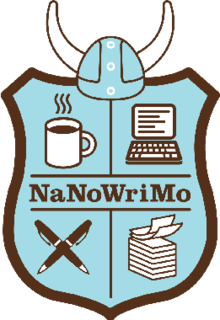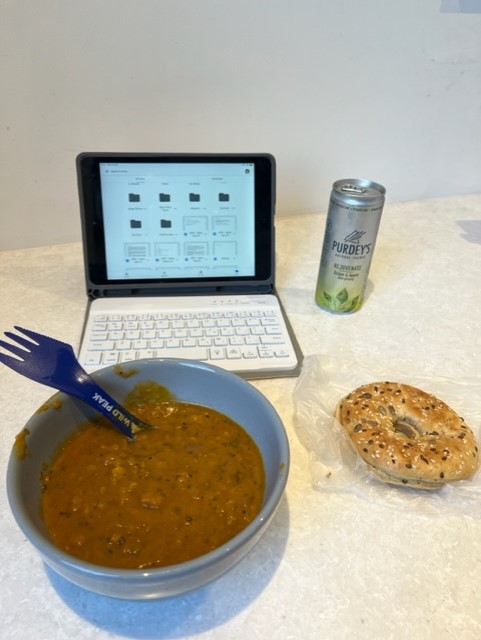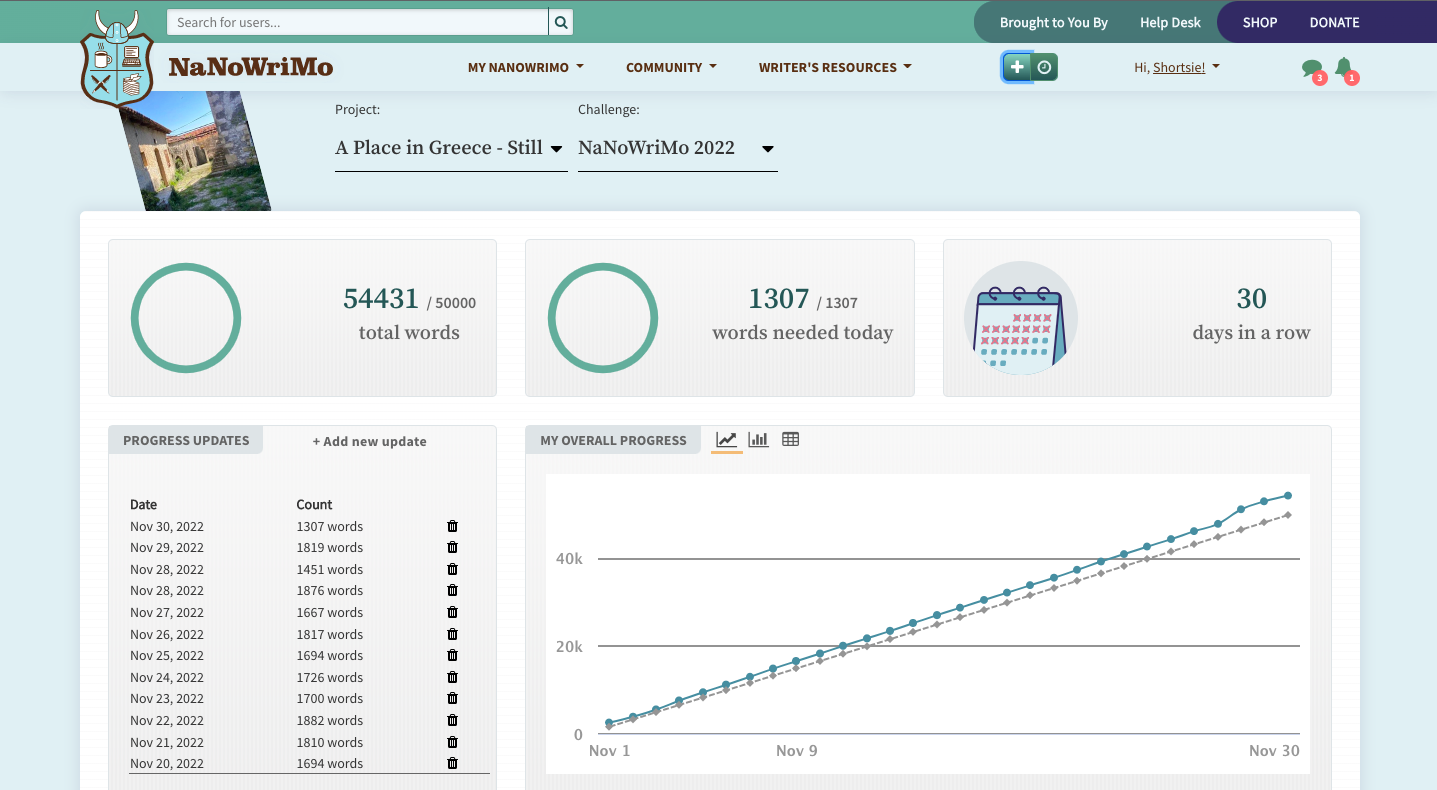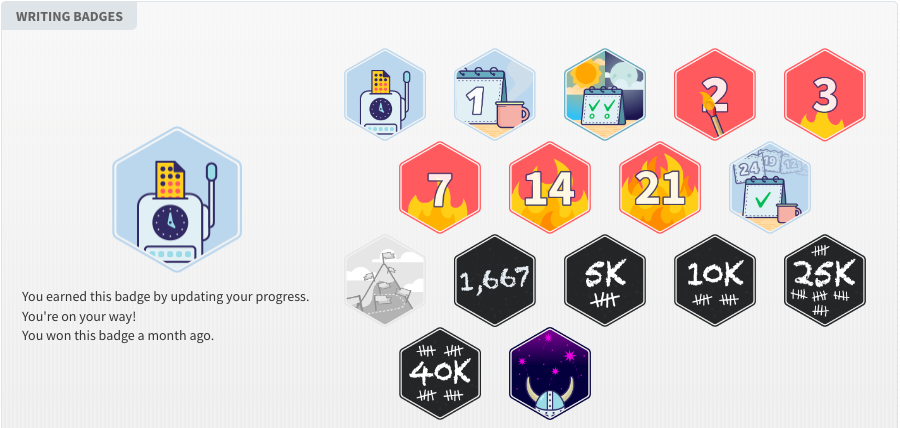 November is NaNoWriMo
November is NaNoWriMo
November is National Novel Writing Month when many writers take part in NaNoWriMo. The challenge, if you choose to accept it, is to write a novel, or part of a novel, consisting of 50,000 words or more. To achieve this goal the average word count per day is equal to 1667. Each day you log your word count on your NaNoWriMo account and collect stickers and kudos on the way. Writers can join local groups and online groups to take part in meet-ups, writing sprints and general socialisingness stuff, designed to encourage and support each other. NaNoWriMo is a non-profit organisation that helps young and new writers achieve their writing goals. For more information on NaNoWriMo and all the good things they do check out their website at NaNoWriMo.
Last year was my first Nano and I managed just over 20k words which I thought was pretty impressive for a first-timer. This year my goal was to beat that target and amazingly I wrote over 50,000 words and did it all before the end of the month! I’m not one to blow my own trumpet but I am jolly pleased with myself.
Now, I am no expert at completing Nano, but as I did pretty well this year I thought I would write a little post about my method and maybe some of my tips will help others who wish to achieve.
APIG - My Nano Project
Firstly, a little bit about my project, I am writing a RomCom set in Greece. The working title is ‘A Place in Greece’ or ‘APIG’ for short. It is the same RomCom that I started last November, and while I have written another 20k words during the year I was determined to get it finished, and I chose to do this via Nano. This would bring me to 90k words altogether which hopefully will be edited down to around the 80k words mark.
So here’s what I did and how I did it...
Planning
 Plan, Plan & Plan
Plan, Plan & Plan
Now I am not a planner when it comes to my stories, I’m more a go-wherever-it-takes-me kind of girl, but when it comes to the ancillary activities surrounding the writing - that I can plan.
Time Planning - I have a full-time job and therefore have to pick to write before work or after work. After work there is too much going on, such as dinner, fitness, socialising etc basically too many distractions that I know my writing would play second fiddle to. I know I write best first thing in the morning so I committed to getting up at least an hour earlier each day to get my words done. I was up at 5:30 every day, huddled on the sofa under a blanket with my laptop, in the dark and the quiet, writing on average 1200-1500 words. I then wrote a few hundred words on my lunch break and if I hadn't finished my 1667 quota for the day, I would rattle off a few in the evening.
Event Planning - November tends to be a month of minimal social events. However, I knew I had a wedding on the second weekend (which was a stay-over-night jobbie) and a weekend away at the end of the month. I took both events into consideration and on the days I wasn't working I wrote double my word count so I had a few days' worth of work ‘in the bank’.
Preparation - I had chapters of my book scribbled down in various platforms. I use Scrivener and Drive to write but also had notes on my phone and even handwritten notes in a notepad. Prior to November, I collated everything together in Scrivener, typed up my notes, put everything in order and jotted down a few ideas about where my story was going in case I hit the dreaded brick wall. I also skimmed through the previous chapters to get me in the mood for writing.
Something’s Gotta Give
 We all have commitments but we can't do everything. If you're going to commit to Nano see if there is anything you can put aside for the month. I like to get up early to work out a few days a week and I also missed out on my lunchtime walks, but for November I just did a few evening runs instead. I try to maintain my fitness levels which is important to me and 'Word Count vs Step Count' is always a challenge. I understand most people have many more commitments than me, kids, pets, extra jobs etc and trying to find time is tough, but anything that can be planned for in advance will help. Writing time often ends up being at the bottom of the priority list, so if for just one month you can raise it up through the ranks and put it first, you might be surprised at the results.
We all have commitments but we can't do everything. If you're going to commit to Nano see if there is anything you can put aside for the month. I like to get up early to work out a few days a week and I also missed out on my lunchtime walks, but for November I just did a few evening runs instead. I try to maintain my fitness levels which is important to me and 'Word Count vs Step Count' is always a challenge. I understand most people have many more commitments than me, kids, pets, extra jobs etc and trying to find time is tough, but anything that can be planned for in advance will help. Writing time often ends up being at the bottom of the priority list, so if for just one month you can raise it up through the ranks and put it first, you might be surprised at the results.
Apart from the two weekender events I had planned, I didn't arrange anything else. Yes, I still met up with friends - all work and no play makes Amelia a dull girl - but I kept it to a minimum, knowing that December festivities were just around the corner. The trip I had planned at the end of the month was to be a celebratory weekend away and to have that to look forward to, was an incentive to keep me going.
Writing Process
I write in Google Drive and then copy and paste it into Scrivener. With Drive, I can write on my laptop at home, switch to my iPad at work and can even write on my phone if I’m out and about and have a few spare minutes. Because it all syncs together it is easy to keep track of where I am. I can also have a running total word count on each document so I know when I’m near my daily target.
For each day I start a new Drive document and name it Nano Day 1, Nano Day 2 etc. This means if I forget to upload my word count to Nano I can easily find what I wrote each day. The shorter the document on Drive, the more quickly they take to load, I can also go straight to where I left off and it makes it easy to copy and paste into Scrivener
I also keep a separate document open - which I imaginatively called ‘Nano Notes’ - where I make a note of things I need to refer back to or need to backfill into earlier chapters. This means I don’t need to go back to previous writing to add in missing scenes and therefore mess up the word count for that day. Instead, I can go back and do this after Nano is over.

The writing produced in Nano is supposed to be a first draft, not a polished, edited version. Typos, grammar errors, name checks and research can all be done later. If I come to a point where I need to come up with a new name, a word I can’t think of or an area where particular research needs to be done I type an XX. This will help me find these points during the editing process.
I do keep an online Thesaurus open for quick reference but if the word I’m after isn’t there and won’t come to mind, I will write an XX next to a similar word so I know where my thought process was going.
If it's because research is required eg about the sunset times in Greece, or some typical Greek Christmas traditions, I will write XX-more research here, etc. It means I can check my details thoroughly and add accurate accounts when I have more time.
These little 'XXs' mean I can keep my writing flowing, safe in the knowledge that these will not be forgotten or missed in the edit.
One little trick that I try to do is to leave the chapter or scene halfway through. It is much easier to sit down and hit the ground running when picking up where I left off rather than starting a new chapter from scratch. Or, at the very least, I will note a few words of what is to happen in the next paragraph or scene so I am ready to crack on with it.
Thinking Time
As for inspiration and getting into the mindset, what I try to do is mentally work on my plot at times when I can’t write ie. driving home from work, dropping off to sleep, or waiting in the queue at Tesco. I only plan as far ahead as the next day so when I come to sit at my keyboard it’s already in my head, ready to spill out onto the page.
Another tip is to tell those around you what you’re doing. That way if you need to turn something down or disappear into a corner, they’ll know why. They will also know how important this is to you and will be there to help you celebrate your win at the end!
Final Thoughts
 At the end of the day, when all said and done and when push comes to shove, the secret to NaNoWriMo is to write, write and write some more. Write as often as you can, wherever and whenever you can. Inevitably life does get in the way, things crop up and not everything can be planned for. We all have families, commitments, occasionally illness and sometimes you just can’t be arsed, but all we can do is our best. The commitment is to no one but ourselves. Yes, we all love to get a certificate (I know I do) but the winner will be you and the progression of your novel. The more words on the page the sooner your masterpiece can be edited, and published and start earning you the big bucks.
At the end of the day, when all said and done and when push comes to shove, the secret to NaNoWriMo is to write, write and write some more. Write as often as you can, wherever and whenever you can. Inevitably life does get in the way, things crop up and not everything can be planned for. We all have families, commitments, occasionally illness and sometimes you just can’t be arsed, but all we can do is our best. The commitment is to no one but ourselves. Yes, we all love to get a certificate (I know I do) but the winner will be you and the progression of your novel. The more words on the page the sooner your masterpiece can be edited, and published and start earning you the big bucks.
As I’ve said, this is by no means a definitive guide to NaNoWriMo, but if it helps someone with their next project it will be worth writing. If anyone has any other tips or comments on what I have written, please feel free to contact me on Facebook or Instagram.
But now I have a 96k novel draft to get into some semblance of order, so happy writing and happy editing x
Please Share My Content
By sharing my content you are helping me reach a wider audience - thank you!